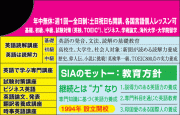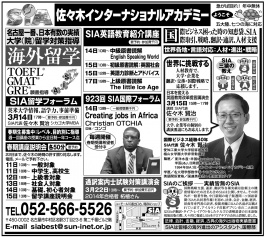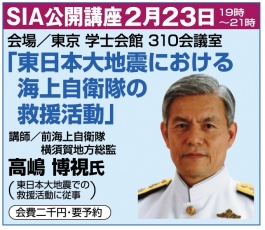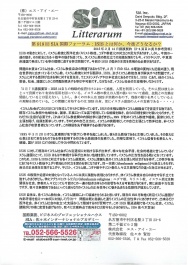2009.10.23
佐々木インターナショナルアカデミー英語専門講座:米国史第22回 Start of the Great Depression 講師:Rich Porter 受講資格 SIA英語評価基準中級レベル
カテゴリー: 佐々木インターナショナルアカデミー
米国史は1年間を通じた90分授業、40回の講義です。次の資料は事前のreading assignmentです。その他、英国史、日本史、世界史、経済、要望に答えほとんどどんな課目でも英語でネイティブが教えています。当校の教育で一番力を入れているのが正確な読解力養成と発音です。世界を目指すビジネスマン、スポーツ選手、芸術家、学者が学ぶ名古屋駅から大変便利な場所にある佐々木インターナショナルアカデミー。他言語も同様な教育を進めています。
The start of the Great Depression represents the focus for next Saturday's lecture. The lecture will be both general and specific. Thus, please note the areas below.
1. Overview: Before and After 1930
2. The Hawley-Smoot Tariff
3. Hoover: From 1929 Crash to FDR's Inaguration
Overview: Before and After 1930
During most of the 1920s, the United States enjoyed a period of unbalanced prosperity: farm prices and wages fell, while new industries, and industrial profits grew. The boom was fueled by an inflated stock market, which later led to the a crash on October 29, 1929. The results of the Hawley-Smoot Tariff, the Dust Bowl, and the ensuing Great Depression, led to government efforts to restart the economy and help its victims with Franklin D. Roosevelt's New Deal. The recovery was rapid in all areas except unemployment, which remained fairly high until 1940.
The Hawley-Smoot Tariff
Last week you received some information about the The Hawley-Smoot Tariff. This week you will hear more details. An example of these details are:
The Smoot-Hawley Tariff Act of 1930 (P.L. 71-361, sometimes known as theHawley-Smoot Tariff Act; officially the Tariff Act of 1930)[1] was an act signed into law on June 17, 1930, that raised U.S. tariffs on over 20,000 imported goods to record levels. The ensuing retaliatory tariffs by U.S. trading partners reduced American exports and imports by more than half and according to some views may have contributed to the severity of the Great Depression.
The act was originated by Senator Reed Smoot, a Republican from Utah, and Representative Willis C. Hawley, a Republican from Oregon. When campaigning for president during 1928, one of Herbert Hoover's many campaign promises to help beleaguered farmers had been to increase tariffs of agricultural products. Hoover won, and Republicans obtained comfortable majorities in the House and the Senate during 1928. Hoover then asked Congress for an increase of tariff rates for agricultural goods and a decrease of rates for industrial goods.
The House passed a version of the act in May 1929, increasing tariffs on agricultural and industrial goods alike. The Senate debated its bill until March 1930, with many Senators trading votes based on their states' industries. The conference committee then aligned the two versions, largely by moving to the greater House tariffs.
In May 1930, a petition was signed by 1028 economists in the United States asking President Herbert Hoover to veto the legislation, organized by Paul Douglas, Irving Fisher, James TFG Wood, Frank Graham, Ernest Patterson, Henry Seager, Frank Taussig, and Clair Wilcox. Automobile executive Henry Ford spent an evening at the White House trying to convince Hoover to veto the bill, calling it "an economic stupidity". J. P. Morgan's chief executive Thomas W. Lamontsaid he "almost went down on my knees to beg Herbert Hoover to veto the asinine Hawley-Smoot tariff."
Hoover opposed the bill and called it "vicious, extortionate, and obnoxious" because he felt it would undermine the commitment he had pledged to international cooperation. Later events would reveal Hoover was right: the international community levied their own tariffs in retaliation after the bill had become law. However, in spite of his opposition, Hoover yielded to influence from his own party and business leaders and signed the bill.
Hoover: From 1929 Crash to FDR's Inaguration
Though Hoover, Republican President from March 4, 1929 – March 4, 1933, had many progressive ideas about the direction he would take the country as President (which would largely remain idealistic fantasies), he was hardly equipped to deal with the struggles of the era. Following the laissez-faire Republican Presidents of Warren Harding and Calvin Coolidge, the country was headed towards financial ruin from the lack of institutional regulation of business. Hoover did not feel it was the job of the federal government be involved in the lives of everyday citizens, but the duty of local government and individuals to be self-sufficient. This contrasted with his years of humanitarian ventures, which should have indicated a more understanding approach to governance. Hoover's ineptitude to understand the need for government intervention and regulation is ultimately what has earned him his place in Presidential history as an ineffectual leader during trying times.
Hoover's opponents charge that his policies came too little, and too late, and did not work. Even as he asked Congress for legislation, he reiterated his view that while people must not suffer from hunger and cold, caring for them must be primarily a local and voluntary responsibility.
Since Roosevelt was not inaugurated until March 1933, this "guaranteed that Roosevelt took the oath of office amid such an atmosphere of crisis that Hoover had become the most hated man in America."
佐々木 賢治 シカゴ大学MBA、国際ビジネス経験30年
SIA Inc. Sasaki International Academy
国際ビジネス、翻訳、通訳、語学教育のご相談は
国際ビジネスのプロフェッショナルハウスSIA!
佐々木インターナショナルアカデミーへ!
**********************
国際ビジネス、語学のプロフェッショナルハウス
佐々木インターナショナルアカデミー
453-0015 名古屋市中村区椿町17-15
ユース丸悦ビル5階
Tel 052-452-5526 Fax 052-452-5536
siabest@sun-inet.or.jp
http://www.sasaki-international-academy.com/
★ 語学教育、翻訳・通訳、国際ビジネスはSIA ★
**********************
このエントリーのURL
URL





